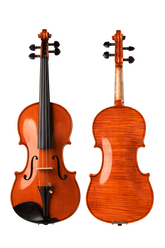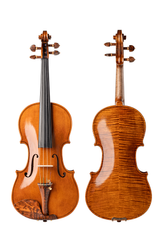The Bad Effects of Cheap Beginner Violins on Children
Over the past year, I've conducted numerous inspections of institutions offering violin enlightenment education, and I've also discussed common issues regarding contemporary children learning the violin with many teachers and parents.
In doing so, I've identified several inherent problems and would like to raise them here for collective discussion.
Children are reluctant to practice the violin
Children show reluctance to practice the violin at home and are unwilling to play in front of their teachers. Sometimes, they even throw tantrums. Encouraging them to practice feels akin to forcing them to take medicine. The responsibility for this issue does not solely lie with the teachers or the children's penchant for play.
How to instill a love for the violin in children, encouraging them to play willingly, is every parent's wish. To solve this problem, we must first identify its root causes. Have you noticed a significant problem? The violins commonly used for beginners are often mass-produced and inexpensive.
Many people believe that since practice violins need frequent replacement, there's no need to invest in high-quality instruments. This viewpoint is flawed, and the problem manifests here.
There may be quality issues with cheap violins
From production to assembly to sound projection, practice violins typically fall short in quality. Common issues include excessively high or low fingerboards, excessively high bridge heights, and excessive string tension, all contributing to increased string height. Consequently, children need to exert considerable force to press the strings. Children's hands are small and tender.
Asking them to use excessive force to press the strings can cause slight discomfort, a key factor in their aversion to the instrument.
The sound of cheap violins makes it difficult for children to continue practicing
The second issue concerns sound quality. Sound is crucial, and the sound produced by these practice violins often resembles that of an erhu (a two-stringed Chinese instrument). This stems from the shoddy construction of the resonating box (this issue is complex and warrants further discussion).
Furthermore, the sound produced is often uneven across the four strings, akin to noise rather than music. This makes it challenging for children to accept, and even adults find it difficult to tolerate.
In such circumstances, how can we cultivate children's interests? If children lack interest, how can we expect them to practice voluntarily? I believe this is a topic worth considering deeply. Interest is the best "teacher."
A good quality violin should be purchased for beginners
Enlightenment education is crucial and should be prioritized. I propose that the violins used for beginners address the aforementioned issues thoroughly. They should provide a comfortable feel, allowing for ease when pressing each note. Correct intonation is essential. While the sound quality may not match that of a professional violin, it should still be pleasant to listen to. At the very least, it should sound like a violin, with even sound production across all four strings and without resembling an erhu. Otherwise, can it still be considered a violin?
Providing children with comfortable and aesthetically pleasing conditions for learning the violin is crucial. They should hear beautiful melodies produced by their efforts rather than unpleasant noise. This will gradually foster their interest in the violin, allowing them to appreciate the beauty and, to some extent, the existence of art.
Violin for Beginners:
Beginner Violin Outfit W/Case, Rosin, Bow, Tuner, Shoulder Rest, Strings, Sticker, Polishing Cloth, Mute Q033
Sale: $299





